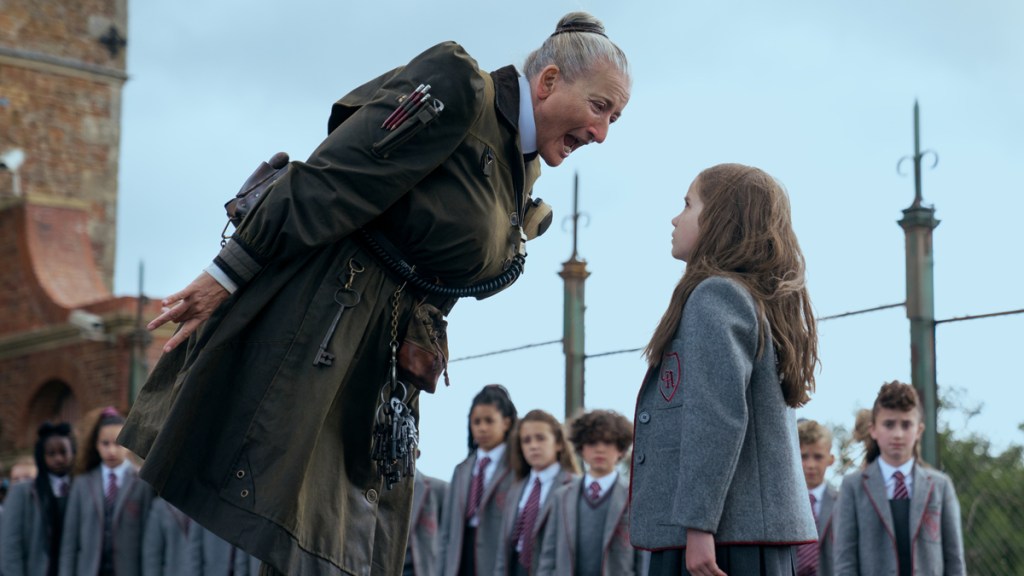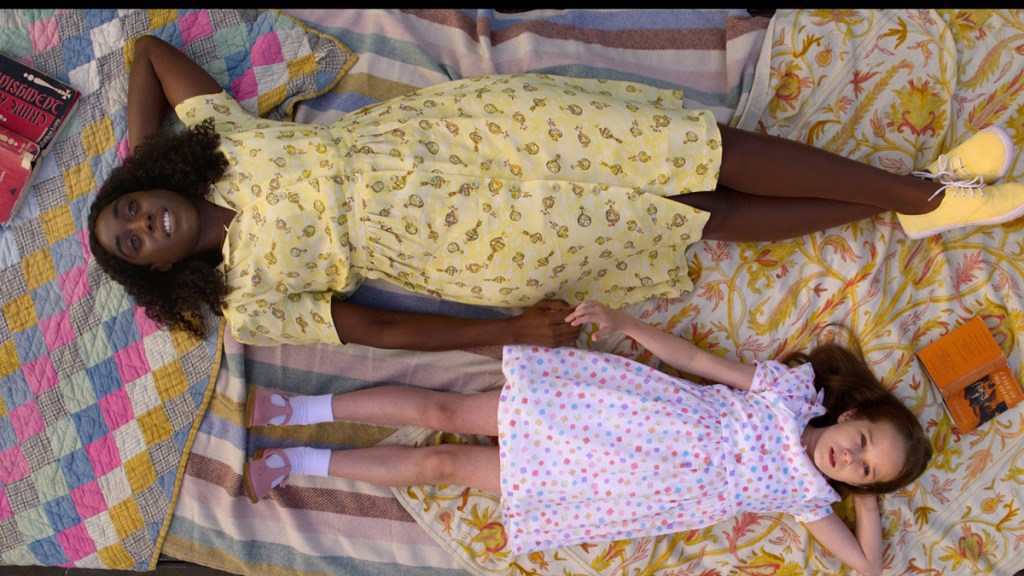Of Course Matilda the Musical Is Upsetting, It’s a Roald Dahl Story
Out now on Netflix, Matilda the Musical is just as disturbing as every other Roald Dahl kids’ story about escaping abuse - but even more powerful.
It is, unignorably, right there in the title: Roald Dahl’s Matilda the Musical. The 1996 American movie adaptation of Dahl’s 1988 children’s book might have snuck by under the unassuming name of just plain Matilda, but the 2022 film version came with a warning: this is a Roald Dahl tale; expect pain.
Dahl stories don’t shield young readers from danger, they delight in showing it off from every angle. His imaginary worlds aren’t places of safety where adults are uniformly kind and kids are adored, they’re places where cruelty thrives… until it’s made to stop. Sadistic teachers, nasty grandmothers, giant bullies and abusive aunts all operate with impunity, right up until the point that they’re dealt with. Ejected with telekinesis, shrunk by a magical potion, trapped in a massive pit, crushed to death by a giant peach… Goodness wins out, but first, it has a fight on its hands.
‘And If It’s Not Right, You’ve Got To Put It Right‘
Matilda Wormwood’s fight is on two fronts: at home and at school. A child prodigy whose mind cuts through classic literature and simultaneous equations like a hot knife through butter, Matilda was born to a pair of ignorant pigs who stand for everything that’s wrong according to Dahl’s world: television over books, TV dinners over home cooking, connivance over morals, flash over substance (see also: the parade of kids who receive cruel and unusual punishments for similar sins in Charlie and the Chocolate Factory).
Home is no sanctuary for this bright little spark, and when she’s hauled into the education system late (her parents forgot to send her), neither is school. Crunchem Hall is run by tyrant Miss Trunchbull, a child-hating, cruelty-loving despot who metes out daily acts of violence to her terrified pupils – a caricature instantly recognisable to the generations educated before the UK’s corporal punishment ban in 1986 (1998 for private schools, incidentally, that additional 12 years ensuring that fee-paying parents really got their money’s worth).
Books aside, school’s one redeeming factor for Matilda is Miss Honey, the kindly teacher who is everything that Trunchbull and the Wormwoods are not. Miss Honey is humble, sweet, clever, and instantly sees Matilda’s uniqueness. The problem is that the pupils of Crunchem Hall aren’t the only abused children in this story; Miss Honey was one too, and the trauma has left her a frightened mouse in the shadow of her abusive-aunt-turned-employer Miss Trunchbull.

Enter: Matilda, whose powers of telekinesis and natural sense of justice – honed no doubt by reading the Russian greats – set to work toppling Miss T’s regime and installing Miss Honey in her place. (“And if it’s not right,” sings Matilda, “you’ve got to put it right.”) When the Wormwoods flee the country and leave Matilda in Miss Honey’s care, it’s happy days for the wunderkind and her new adoptive mother, but their route to happiness was paved with pain.
‘Sometimes You Have To Be a Little Bit Naughty’
Nowhere is that made clearer than in the 2022 film adapted from Dennis Kelly, Tim Minchin and Matthew Warchus’s stage musical. The movie softens none of the Wormwoods’ abuse or Trunchbull’s violence. We see Matilda’s father throw her onto the floor, and hear her repeatedly called a goblin, a gremlin, a worm, – wrongly – a boy, and dehumanised as “it”. The film stages the headmistress’ cartoonishly brutal attacks on tiny pupils in a couple of memorably upsetting scenes, which met with some criticism on release. There’s a general murmuring that the disturbing depiction of bullying is too prominent and too extravagantly presented for a young audience.
Welcome to the gruesome world of Roald Dahl, or indeed, of fairy tales and nursery rhymes, where human bones are also crunched by giants and mouse tails also cut off with carving knives. Matilda the Musical’s violence is all there in the hugely popular and widely read book. On screen, it shouldn’t have come as any surprise.
What may come as a surprise about the musical is its emotional power, deep weirdness, and revolutionary political thrust.
To start with the politics: director Matthew Warchus’ film uses prison movie trappings to set up Crunchem Hall as a surveillance-heavy penitentiary. Matilda’s instinctive rebellion against Trunchbull’s tyranny spreads through the oppressed crowd like a lit fuse, inspiring other explosive acts. After Matilda says no to the headmistress in front of the others, her words become a revolutionary slogan. “No” starts to appear on graffiti around the school and pinned inside blazers. When Matilda uses her magical powers to finally oust their dreaded head, a gang of pupils pull down her statue with ropes, Saddam Hussein and Edward Colston-style.
One of the musical’s three best songs (the others being heart-breaking ode to lost optimism “When I Grow Up” and neurodivergent hymn “Quiet”) and unarguably its best dance number is “Revolting Children”, a pounding anthem that celebrates youthful rebellion. Though Matilda the Musical – to judge by its cars, clothing and Curly Wurly wrappers – is set in a vaguely 20th century past, the joy it takes in kids standing up to the establishment couldn’t feel more urgent or more now.
‘All Escapes Start With the Click of a Lock‘
But not more here. Matilda the Musical’s mad, pirouetting feet never touch the ground. The film is, to put it extremely fondly, bonkers – from the styling and the expressionist dream sequences, to the fantasy ending in which a Grease-style carnival comes to school grounds and pupils joyfully feed a giraffe from a third floor window.
There is a scene in which Emma Thompson-as-Agatha Trunchbull swings like Frangonard’s elated pastel swinger and imagines a child-free world filled only with horses, that will make you think you’ve stopped taking your medication. An (overlong) but colourful backstory is told involving two circus performers . Songs become dreams and wishes become fantasies and stories become histories, blurring the line between ‘real’ and ‘imagined’ so much that it’s not even there. And yet.
‘Nobody But Me Is Going To Change My Story‘
The emotional power of Matilda the Musical is still capable of knocking you off your feet, largely thanks to excellent performances from Alisha Weir as Matilda, Lashana Lynch as Miss Honey, and Andrea Riseborough as the odious Mrs Wormwood. Look past all the stage school kids hitting their marks and their high notes, and those three are the ones to watch. Riseborough because she doesn’t just play Mrs W as a neglectful mother, but a sadistic cretin whose sneers of enjoyment at Matilda’s abuse are nastier than anything dealt out by the Trunchbull.

Watch Weir and Lynch, because their absolute commitment makes Matilda and Miss Honey’s relationship a desperate and gorgeous love story to beat the ages. They’re two survivors who escape abuse and, unvalued and mistreated by their real families, forge a new one where they can be exactly who they really are, together.
Add, if you care to, Mr Wormwood’s repeated misgendering of Matilda, and her suspicion that inside her head, she’s “not just a bit different” from all of her friends, and it’s an outsider story par excellence. Sexuality, gender, autistic spectrum disorder… lay whatever meaning you care to on top, and this clever, emotional musical can support the weight.
Matilda has always been a misfit story, a brains vs brawns revenge of the nerds tale about prophets not being appreciated in their homeland. That’s why it’s always been beloved by bookish kids whose pent-up emotions fizz until it feels like they too could move objects with their mind. It’s a tale of finding a home when the one you’re given mistreats you, about creating your own quiet amid so much distracting noise. It’s about growing up and entering the life you know is out there for you, even if the door to it has been locked tight. Of course it’s disturbing. Any story about escapism first needs something to escape.
Roald Dahl’s Matilda the Musical is available to stream now on Netflix.

